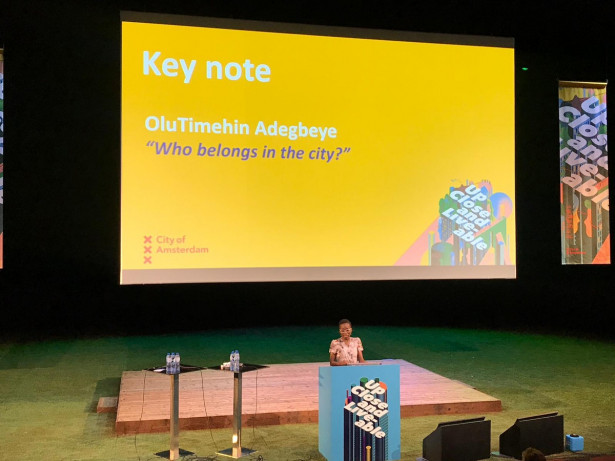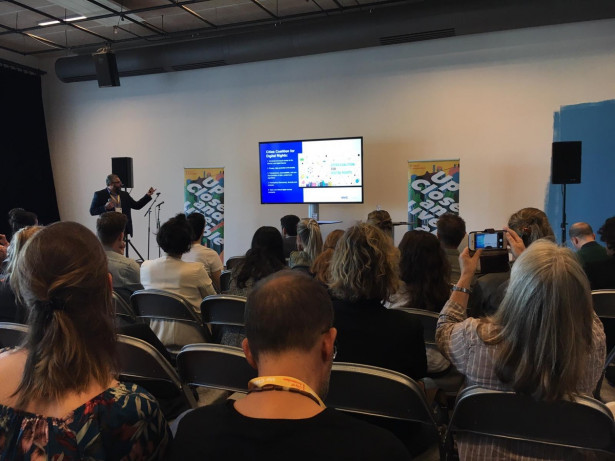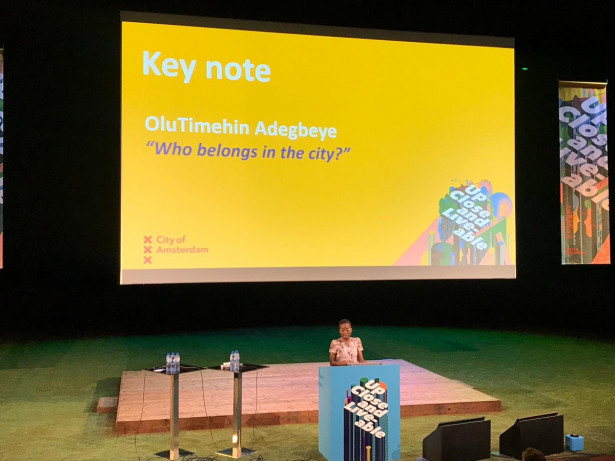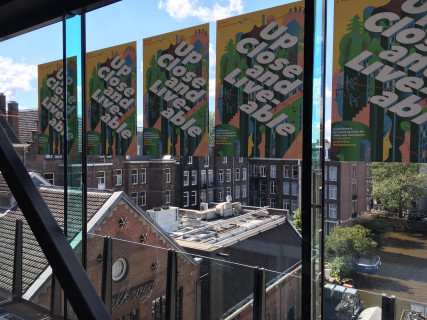By many accounts the Amsterdam of today represents an urban success story. Despite all the positive changes however, there are many complex social challenges that need addressing. In a short period of time, Amsterdam has transformed drastically in terms of population and economic development but also in the number of visitors.
These urban challenges were the focus of the 2nd Up Close and Liveable Conference which took place on June 21 as part of Amsterdam’s WeMakeThe.City festival. A recap by our special reporter Katerina Ryabets.
By many accounts the Amsterdam of today represents an urban success story. Despite all the positive changes however, there are many complex social challenges that need addressing. In a short period of time, Amsterdam has transformed drastically in terms of population and economic development but also in the number of visitors coming to the city.
These urban challenges were the focus of the 2nd Up Close and Liveable Conference which took place on June 21 as part of Amsterdam’s WeMakeThe.City festival. The conference brought together an international audience of urban professionals, researchers, policy-makers, and city-dwellers to address a range of social urban pressures, ranging from access to housing and climate justice, to the impacts of increased tourism, the protection of digital human rights, and urban health.
So, who belongs in the city?
Well-known for her popular TED talk on the topic of urban belonging, the Nigerian writer, editor, and activist OluTimehin Adegbeye kicked the day off with a keynote address and the question: who belongs in the city? In her talk, OluTimehin reminds us that our cities are reflections of ourselves, and that it is up to us to keep both our governments and ourselves responsible for creating safe and accessible cities for all: “If cities are to continue to exist we cannot accept systemic exclusion as part of the urban experience. Cities are only as exclusionary as we make them”.
Speaking from her experiences in her hometown of Lagos, Adegbeye raised challenges that are being felt in cities across the world, from Nigeria to the Netherlands. Her speech reminds us that the feeling of belonging in a city is not universal and the unfortunate reality is that the urban experience does not offer the same opportunities for all.

“The promise of cities lies in the remarkable ability to aggregate the vast spectrum of human possibilities and create new and unforeseen realities from that. We all lose when cities are allowed to become hubs of homogeneity.” - OluTimehin Adegbeye
Community-centered interventions for improving urban health
The morning breakout session on improving urban health highlighted an important theme that would run through the rest of the day. All speakers stressed the necessity to consider the day-to-day lived experiences of underserved or marginalized individuals and communities when developing policies or interventions to address urban inequality.
Jessica Attard from the Guy’s and St. Thomas’ Charity in London shared insights from their efforts fighting childhood obesity in two of the city’s most diverse and deprived boroughs. She explained that to be able to positively impact the health of vulnerable communities we must first start with a change in perspective to really understand the lived experiences of these groups. This sentiment was echoed by Cecilia Vaca Jones, Program Director of the Bernard van Leer Foundation whose work with initiatives such as Urban95 focuses on improving urban environments so that children and families can thrive. Like Attard, she challenged the audience to consider the city from the perspective of its smallest and most vulnerable users, arguing that if we can make cities work for them, they will work for everybody.
Accessibility and inclusivity in the digital city
A later session focussing on the topic of digital human rights (rights that individuals and communities are entitled to when accessing and using the internet and other digital technologies) introduced the work of the Cities Coalition for Digital Rights- a joint initiative launched by the cities of Amsterdam, Barcelona and New York City to protect and uphold human rights in the digital realm. In explaining the goals of the Coalition, Max Sevillia, Director of External Affairs at the City of New York spoke about the necessity of putting a foundation of digital human rights at the core of urban technological interventions or platforms that cities introduce.
The internet plays a central role in our daily lives, and for those without equal access to digital technologies, accessing governmental services, searching for employment opportunities or even pursuing education represents a real challenge. By sharing insights, and co-creating actionable plans, the cities within this coalition are putting their weight behind protecting and promoting digital human rights and are focused on eliminating the barriers that different groups face in accessing technological opportunities.

“We are often sold on the idea of smart cities. But it’s much more important to be a wise city. Wise cities put people first. '' - Daniel Sarasa Funes, Urban Innovation Planner, Zaragoza City Council (Spain)
Do better policy tools lead to more equal cities?
One of the final sessions of the day turned the discussion over to the tools that politicians and planners are using when developing policies addressing urban inequalities. The Social City Index, created by the International Federation of Housing and Planning (IFHP) is a tool that can be used to provide municipalities with a better understanding of how their city is doing along various social indicators at the city and neighbourhood levels.
The goal is to assist in decision making, ideally fostering cross-departmental collaboration within local and regional governments. While there was a unanimous agreement from the panel about the importance of collecting measurable data for informed decision making, Professor Darko Radovic of the Keio University in Japan raised an important point. He reminds us that while data can help paint a picture of the state of society, we must be aware that numbers are not neutral, and to continue to consider those groups and individuals whose experiences may not be adequately covered by selective indicators. In other words, we must be curious about what the numbers aren’t showing us.
Putting the individual at the heart of complex problems
After an inspiring and thought-provoking conference, by far the greatest takeaway was that anyone concerned with improving accessibility and inclusivity in the city, be it governments or societal groups must begin their efforts with a deep understanding of the day-to-day realities of the communities that they wish to empower. Unfortunately there is no magic pill for fixing urban inequality, but it is only from this consideration for the lived experiences of the city’s most vulnerable users that we can take meaningful strides towards making cities better for all.






You might be interested too in my new short essay: Healty cities: http://smartcityhub.com/healthy-cities/